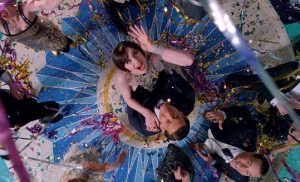Calvin Law explores anachronistic, jukebox film soundtracks.
It’s a principle that, at a most basic level, applies to food, and extends to the creation of everything else. You can have the greatest ingredients at the world at your disposal, but if you don’t arrange, order and mix everything together in the right way, your shot at glory could become just another futile attempt. Like recipes, film soundtracks are more than just playlists of songs which the director and production team pick on whim and fancy; they have to be integrated into the plot and tone of the film. Fail in this regard, and it will be one of the factors that ruins the film. Succeed, and it can become one of the most iconic, lasting impressions that a film makes on the pop culture circuit. Sometimes, films seem to strive for these heights, but end up failing spectacularly.
Take David Ayer’s Suicide Squad, for example. On paper, the soundtrack is impressive; an eclectic array ranging from Panic! At the Disco’s rendition of ‘Bohemian Rhapsody’ to ‘You Don’t Own Me’ by Grace feat. G-Eazy, and other iconic tunes such as ‘House of the Rising Sun’ and ‘Seven Nation Army’. Whilst this collection of music may be great for a gym playlist, it can be a bit distracting if not integrated into a film correctly. Suicide Squad has too many songs packed into one film; a number of them play onscreen for just a few seconds, poorly edited into a sequence that often bears little thematic relation to the song, before being jarringly cut off. In Ayer’s film, good music is used badly, fragmenting the film and disorientating the viewer. As a flawed film on the whole, the use of music could have been the saving grace of Suicide Squad, used to pace the film’s action sequences and bring the narrative to a more satisfying conclusion. As it is, the rap music in the action sequences and the poorly inserted and cut off ‘Bohemian Rhapsody’ only further emphasize its flaws.

A good counterpoint to Suicide Squad is its Marvel equivalent of the ‘ragtag heroes’ movies, James Gunn’s Guardians of the Galaxy and its recent sequel. In both films, a similarly eclectic soundtrack is used. Director Gunn manages to implement it far more naturally by styling Peter Quill (Chris Pratt) as a huge ‘music buff’ who takes his Walkman wherever he goes. The score to the films is workmanlike but effective, in the usual Marvel Universe filmography tradition, but it is the songs which are more organically integrated into the film’s plot and themes that really shine.The intradiegetic inclusion of songs is always a good way of ensuring that music on screen doesn’t seem forced or out of place, and Gunn and co. go a step further by making sure each tune is in perfect coordination with what’s going on screen. Whether it’s Joan Jett’s ‘Cherrybomb’ segueing into a delightful ‘preparing for battle’ sequence, to Yondu taking out throngs of miscreants to the strings of ‘Come a Little Bit Closer’ by Jay and the Americans, no song is amiss amidst the colourful onscreen antics. The editing and the soundtrack flow in perfect harmony, with each aspect amplifying the other. Unlike Ayer’s project, Gunn’s beautifully chaotic soundtrack only adds to the ambience – everything fits, in its own surprising way.

Throughout the history of film, many film soundtracks have become iconic in pop culture. Famed auteurs like Paul Thomas Anderson, Martin Scorsese, Sofia Coppola, and Quentin Tarantino are renowned for their eclectic onscreen use of music from various ages and genres. Marie Antoinette (2006) is a particularly interesting example. Sofia Coppola juxtaposes rock music with the setting of 18th Century France; it somehow complements the extravagant setting, much in the way the pop and rap dominated soundtrack of Baz Luhrmann’s The Great Gatsby (2013), or the Queen-heavy tunes of Brian Helgeland’s A Knight’s Tale enhance the quality of those films, despite a chronological dissonance. The music is anachronistic to these time periods, but contrasting the ornate old-school visuals and costumes with very fast-paced and modern editing and musical choices, creates a unique cinematic effect, utilizing all the potential of the medium. These films manage to make this clash of sensibilities feel artful and stylized, while completely appropriate for the vibrant tones of their respective films. Contrasting the modern and the old, bringing these two different periods together, provides an extra level of fantasy: films do not have to subscribe to the linearity of lived experience. There are no limits placed upon the cinematic imagination.

As for talents like Scorsese and Tarantino, their use of music can be essentially boiled down to what they think sounds ‘cool’, and apt for the given moment. One could accuse them of randomly selecting songs without any sense of the time period or context that led to their conception. But the jukebox-style of their film soundtracks is very fitting for directors whose films often dabble within a wide range of genres and styles. An eclectic blend of just about any kind of music seems most fitting for these directors who can switch from lighthearted comedy to brutal violence in a blink of an eye; a kind of fluidity that Guaridans of the Galaxy succeeds in, where Suicide Squad fails. And when you have talents who can strike fear into your heart through Eric Clapton’s voice combined with Robert de Niro’s raised eyebrows, or turn a combination of the Delfonics and blaxploitation homage in Jackie Brown into something strangely beautiful, what is there to criticise?
Featured image: Still from Coppola’s ‘Marie Antionette’ (image courtesy of pluggedin.ca)





